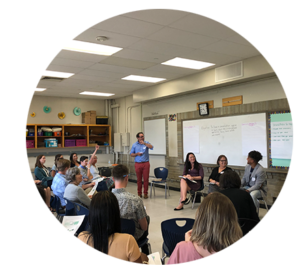 It’s finally summertime in Colorado where students and [hopefully] educators can get the much needed rest they deserve. A+ Colorado delivers all the education news you’ll need to avoid the Summertime Slump including: a new face joining the A+ team, an event and report for Denver’s Next Journey, a coalition’s Report Card rating the state, a policy for handcuffing students, and plenty more.
It’s finally summertime in Colorado where students and [hopefully] educators can get the much needed rest they deserve. A+ Colorado delivers all the education news you’ll need to avoid the Summertime Slump including: a new face joining the A+ team, an event and report for Denver’s Next Journey, a coalition’s Report Card rating the state, a policy for handcuffing students, and plenty more.
A+ Updates
Navigating Denver’s Next Journey Event

Last week A+ Colorado hosted Navigating Denver’s Next Journey, bringing together over 75 educators, community members, activists, and families at the stunning school campus of Trevista at Horace Mann.
A+ shared findings from the first four briefs of Denver’s Next Journey while engaging in a community conversation rooted in facts about the challenges and opportunities facing Denver schools and students. The afternoon began with a short presentation with big takeaways from each brief to allow for a common understanding before proceeding into small group breakouts. Attendees then selected one of four topics to dive into during small breakout sessions including: Eliminating Academic Inequities, Community Partnership in School Improvement, Choice in a Gentrifying City, and How Should We Measure Quality. The small groups included expert commentary within each topic (shoutout to our stellar education leaders!) where we heard varying perspectives from the community while sharing questions, opportunities, and challenges facing DPS. The afternoon concluded with a large group discussion allowing for guests to briefly discuss takeaways from the small group discussions and identify future questions to drive research and policy recommendations to improve education for students.
A+ is grateful to the community members who participated in these thoughtful conversations while hearing different perspectives and sharing learned experiences. Questions which arose from this event will help guide potential new research for A+ to dig into and present to education leaders during future conversations.
A+ Welcomes New Director of Advocacy
 David Cazares Morales joins A+ Colorado as the Director of Advocacy with ambitions to further improve the quality of public schools and help families become actively involved in their child’s education. After working on several political campaigns and interning at the US Department of Housing and Urban Development, he developed a passion for civic engagement and education reform. Most recently, he was a Policy Consultant for the Colorado Department of Education where he developed adult education policy through community outreach and qualitative analysis.
David Cazares Morales joins A+ Colorado as the Director of Advocacy with ambitions to further improve the quality of public schools and help families become actively involved in their child’s education. After working on several political campaigns and interning at the US Department of Housing and Urban Development, he developed a passion for civic engagement and education reform. Most recently, he was a Policy Consultant for the Colorado Department of Education where he developed adult education policy through community outreach and qualitative analysis.
David earned his B.A. in Urban Studies from the University of California, Irvine and his MPA from Brown University as a first-generation student. He is originally from Soledad, California a tight-knit community in the Salinas Valley.
Denver’s Next Journey: Communicating “Good Schools” to Families
 A+ Colorado has released the fourth brief from Denver’s Next Journey, which looks at Denver’s School Performance Framework and if families can easily understand the information provided on the SPF and whether schools within DPS are serving students well.
A+ Colorado has released the fourth brief from Denver’s Next Journey, which looks at Denver’s School Performance Framework and if families can easily understand the information provided on the SPF and whether schools within DPS are serving students well.
A+ Colorado strongly believes in the importance of the SPF as an essential tool to help understand how schools are serving students, but the report highlights that the current tool is not meeting the needs of families, educators, or the community. As we begin the process of reimagining better schools for the next generation, it is critical to understand how we got to where we are, and what lessons can be learned as we move forward in understanding and communicating school quality.
The district has been responsive to community conversations with the creation of the Quality Schools Task Force which will work to reimagine and co-create an improved SPF. After reading Communicating “Good Schools” to Families, we strongly encourage you to apply to serve on the task force, if you would like to engage with this process further.
Read Communicating “Good Schools” to Families. The remainder of Denver’s Next Journey briefs will be released throughout the Fall including topics on Educators and Governance.
News to Share
Why is it so hard to find where High Performing Schools are in Colorado?

Stephanie, a 6th grade Latina living in Jefferson County, the 2nd largest district serving students in Colorado, has struggled with her grades throughout adolescence. Stephanie’s family wants her to attend a school nearby where Latinx students are meeting expectations, in hopes that her needs can be met and her grades can improve. Unfortunately, in Jefferson County School District, you can only tell whether students are meeting grade level expectations at 35 of 66 schools, which serve more than 16 Latinx students. That means there are 31 schools in the district, that serve more than 16 Latinx students, where you cannot tell if those students are meeting standards. How can Stephanie’s family make an educated decision about where their 11-year old goes to school without this information? They can’t.
Last month, the Right to Know Coalition released a Report Card which rates how the state shares public education data, similar to the information Stephanie’s family is requesting.
A+ Colorado is a member of the Right To Know Coalition, a group of organizations, families, public-school advocates, researchers, and educators who have come together under the belief that knowledge is power and improvement is needed in our schools.
Members of the coalition have shared personal pieces and stories of how this limited data impacts their work and the lives of students and families they work with directly.
As an organization that places tremendous value on transparency, data-driven decision-making, and equitable student outcomes, we support the work of the Right To Know Coalition to help ensure that all Coloradans have access to important academic performance data about schools and districts in the state. Learn how the state performs and what you can do to demand change for Colorado’s students and families.
Student Discipline Policies: Handcuffing Young Students
A+ Colorado applauds Denver Public Schools’ School Board for banning the use of handcuffs for any elementary school-age children, with the exception for students with deadly weapons, at last week’s board meeting. There were a number of recent discipline incidents in Denver elementary schools in which very young children were restrained with handcuffs. This practice had apparently taken place without the school board or other senior district officials being aware. These practices can have a lasting negative impact on a student’s development.
While we are glad to see this practice going away in Denver, it raised questions for us about other school districts and their policies and practices related to restraining younger children. Does Aurora, JeffCo, Adams 14 or other districts use handcuffs for elementary school-age children? Or do local law enforcement, in collaboration with districts, use handcuffs for younger children as several larger school districts do in other states? Or is the use of handcuffs banned for certain ages of students? A+ Colorado will be keeping a close eye on these policies and practices as future conversations and decisions arise around school discipline practices in the state.
Student Testifies on Lack of Mental Health Resources in Denver Public Schools
The Colorado Youth Congress, an organization that trains diverse communities of young people to lead systems change, has been working closely with students for a Mental Health Campaign. Daijah Mijares-Morales, a student at DSST College View High School courageously testified to the Denver School Board in May on the issue of the lack of mental health resources in DPS. Read Daijah’s shared testimony and moving story.
Aurora Public Schools finalizes Phase 2 of Blueprint
Aurora Public Schools central office staff recently presented a Blueprint APS draft framework to the School Board highlighting what next steps for the district could look like. The Board will now have time to tweak or suggest changes to the framework before the district begins on Phase 3 which will be focused on what implementation could look like. The Blueprint APS process started last fall and has included opportunities for community feedback during each phase. An overview of the process can be found on the Blueprint APS site.
Colorado State Board Discussion and Decisions on Accountability
The Colorado State Board of Education had a lively discussion last week in Salida regarding where to set the bar for student performance. The questions and discussion related to how long it should take for students to reach the state standard and what the cut points should be for certain levels of school performance. Should it take 2, 3 or 4 years for students to reach a state standard? Should the top level of schools “Accredited with Distinction” be the top 7, 10 or 15%? The next board meeting will see more discussion and some possible decisions.
On a related note, the Colorado State Board of Education did not allow HOPE Online an opportunity to continue operating in Aurora (vote was along party line 3:3). HOPE will continue to operate in a number of other Colorado school districts in spite of their poor student results.
Where are Students of Color Graduating at a High Rate in Colorado?
As we wrap up graduation season, we are re-sharing a map highlighting which schools in Colorado are doing the best job at getting students to graduate on time, by race and ethnicity. Find out where students are graduating at the highest rates. For example, Fountain-Fort Carson High School in the Fountain 8 school district had a 91% graduation rate for Black or African American students — one of the highest in the state! Read the full A+ Answers here.
District Spotlight Meets A+ Answers
A community member asked A+ Answers, “How does a rural district like North Conejos have such high graduation rates?” This seemingly simple question is incredibly complicated. Intrinsic in this question are further questions that merit further research, like resource allocation to rural schools and the interplay between graduation rates and other measures of success. To begin exploring what’s going on in North Conejos, A+ looked at how North Conejos compares to similar districts to better understand their performance. Read the full A+ Answers here.
Ask The Next A+ Answers. Get in contact with us!
Upcoming Events
July 22-26, 2019 | Education Systems Leadership and Policy Institute
The deadline to apply to the second annual Institute in Education Systems Leadership and Policy is quickly approaching on June 28. The Institute includes special guests such as A+’s very own Van Schoales, with a deep dive into education systems leadership, politics and policy, and offers participants a unique opportunity to explore the challenges and opportunities that come with redesigning how education is organized, governed, and delivered.
A+ in the News
How are Colorado schools doing? Advocates say the state still holds back too much data, Chalkbeat
Report calls for more school transparency, The Denver Channel
Transparency advocates say Colorado hides too much data on school performance in name of student privacy, The Denver Post
A+ Colorado reports look at effectiveness of changes in Denver Public Schools, future of district, The Denver Channel
Want A+ Colorado news delivered to your inbox? Subscribe!